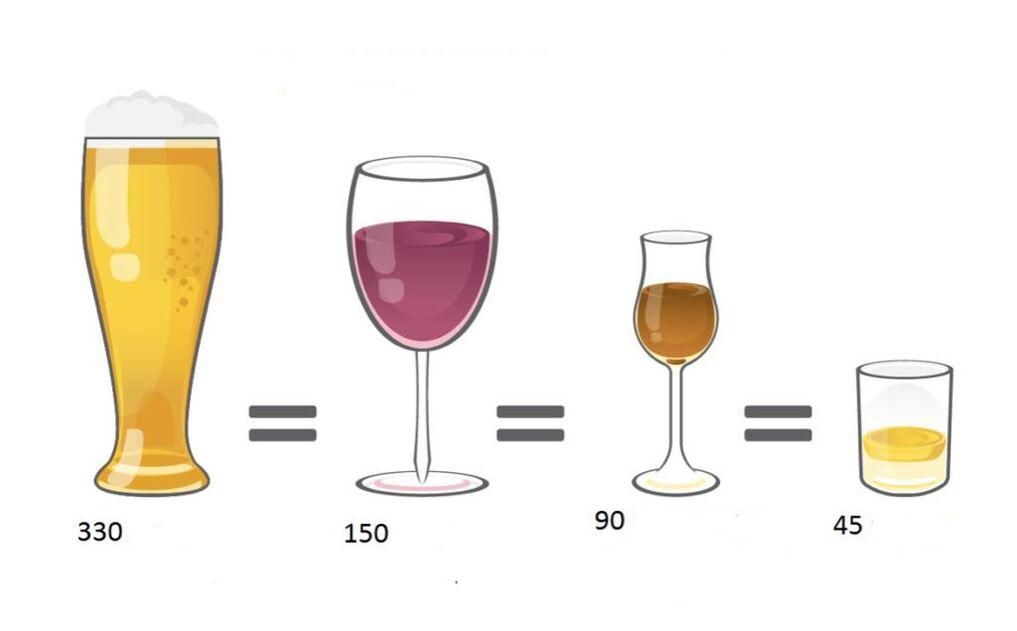
Many people do not drink alcohol during the work week, but allow themselves to relax on the weekend by drinking several bottles of beer or stronger drinks a day. It is worth considering that this approach is dangerous and can cause health problems. This is due to the fact that it is difficult for the body to process a large dose of alcohol that was taken within 2 days.
To avoid serious problems, you need to know what dose of alcohol per day is considered safe.
Is there a safe amount of alcohol?
Doctors have not yet reached a consensus on whether there is a dose of alcohol that is harmless to the body. Some believe that 200 ml of wine or 50 ml of vodka (cognac) 2-3 times a week is a completely acceptable amount of alcohol that will not affect your health in any way. Others are of the opinion that even such a small amount increases the risk of various health problems and leads to alcoholism.
There are special tables and formulas that can help you calculate approximately how much alcohol you can drink without harming your health. But it is necessary to take into account that it is impossible to rely on them 100%, since the values obtained are average. For each person, the safe dose of alcohol is individual. The parameter depends on gender, age, weight and the presence of chronic diseases.

Safe amount of alcohol per day
Many studies and experiments have been conducted to determine the daily intake of alcohol. Most Western and our doctors agreed that without harming health, a middle-aged and complex man can drink the following per day:
- wine - up to 200 ml;
- beer - up to 500 ml;
- vodka (cognac, whiskey) - up to 50 ml.
For the fair sex, the following amount of alcohol is considered safe:
- wine - up to 100 ml;
- beer - up to 330 ml;
- strong drinks - up to 30 ml.
It is worth considering that, due to their anatomical features, women are drawn to drunkenness much faster, so alcohol addiction can develop in them after 1. 5-2 years of daily drinking.
How much can you drink a week without harm?
WHO (World Health Organization) has calculated how much alcohol per week can be consumed without harming health. The safe dose is indicated in portions, where a standard portion is 10 ml of ethanol or 8 g of alcohol.
For men
For men, it is acceptable to drink 3 units of alcohol per day or 21 units per week, subject to two completely sober days.
For women
Women are not recommended to drink more than 2 servings of alcohol per day or 14 servings per week. To avoid health problems, ladies should also drink at least two-day intervals.
Is there a safe standard for a driver?
Many drivers are interested in how much alcohol they can drink and in what quantity before getting behind the wheel. According to established standards, the concentration of pure alcohol in the blood serum should not exceed 0. 35 ppm. This standard was introduced due to the fact that alcohol is always present in a person's blood, even if alcoholic beverages have not been consumed before.

Alcohol enters the body because it is found in many foods, including kefir, some fruits and baked goods. Each country has its own permissible blood alcohol levels for a driver.
Moderate alcohol consumption
To avoid health problems and minimize the risk of developing alcohol addiction, you should drink in moderation. It is especially important to know your norm for people who have problems with alcohol, for example, those who, after a few glasses of vodka, lose control over their behavior or become very aggressive.
Even with moderate alcohol consumption, it is recommended to adhere to the following rules:
- You should absolutely not mix different types of alcohol with each other;
- after severe stress, it is not recommended to drink more than 70 ml of strong drinks;
- while drinking alcohol, you should refrain from smoking, as nicotine increases intoxication;
- It is better to eat citrus drinks, as the substances present in their composition accelerate the process of alcohol breakdown.
As for restrictions, even with moderate alcohol consumption, it is recommended to refrain from taking medications, as alcohol can neutralize or, conversely, increase their effect.
How to calculate your alcohol limit without a hangover?
To avoid a hangover the next day after a feast, alcohol consumption should be moderate. If we talk about specific types of alcoholic beverages, then on average for 1 kg of body weight there should be no more than:
- vodka - 4 ml;
- beer - 30 ml;
- wine - 12 ml;
- tequila - 3 ml;
- absinthe - 2 ml.
It is worth considering that over the years, the dose of alcohol should be gradually reduced, since in adulthood the body no longer copes with ethanol as effectively and the process of its elimination slows down. The more ingredients present in a drink, the more difficult it is for the body to cope with it. After drinking cognac, whiskey or absinthe, the hangover will be worse than from the same amount of vodka.
On a note! Drinks and foods consumed along with alcohol have little effect on the severity of a hangover. How you feel the next morning depends only on the quantity and quality of what you drink.
How much can you drink without getting drunk?
Even with moderate alcohol consumption, it cannot be guaranteed that a person will not get drunk. Narcologists claim that the risk of developing alcoholism depends mainly on genetic predisposition. The psycho-emotional state also plays an important role.
In any case, it is necessary to remember that regular consumption of alcoholic beverages (even in moderate quantities) is addictive and can cause alcohol addiction.

In international medicine, there is such a term as "critical dose" - this is the maximum amount of alcohol that a person can drink without the risk of passing into stage 2 or 3 of alcoholism. Any person who suspects they are becoming addicted to alcohol should know roughly what stage they are in. This is very important to prevent the progression of the disease and to maintain a stable level.
People who drink alcohol in moderation and are between stages 1 and 2 of alcoholism can drink no more than 100-300 ml of vodka once a week. This amount of alcohol will not cause serious harm to health and will prevent the situation from worsening.
On a note! With alcohol abuse, the risk of becoming an alcoholic is particularly high among people under 20 years of age.
Formula for determining individual alcohol rates
Health experts have developed a formula that can be used to calculate an individual's alcohol intake. Using this method, you can independently determine how much alcohol you can drink per day without harming your health.
The base is 1. 5 g of ethyl alcohol per 1 kg of human weight. If a person weighs 70 kg, the individual dose of ethanol is 105 ml. In any case, it is necessary to understand that such values are average, since a lot depends on age, gender and physiological characteristics of the body.
CONCLUSION
When consumed in moderation, alcohol does not harm health. This is especially true in cases where high-quality drinks made from natural ingredients are consumed.
To minimize the risk of unwanted complications, it is recommended to calculate the individual intake of alcohol and not exceed it. And of course, it is necessary to remember that even in minimal quantities it is not recommended to consume alcohol more than 2-3 times a week, as this can provoke the development of alcohol addiction.























